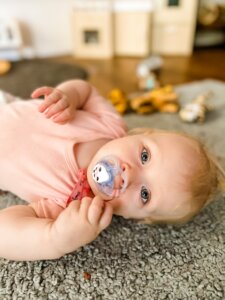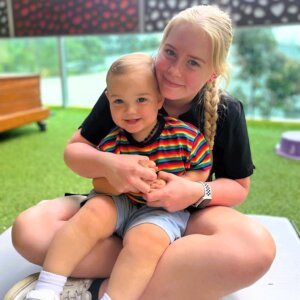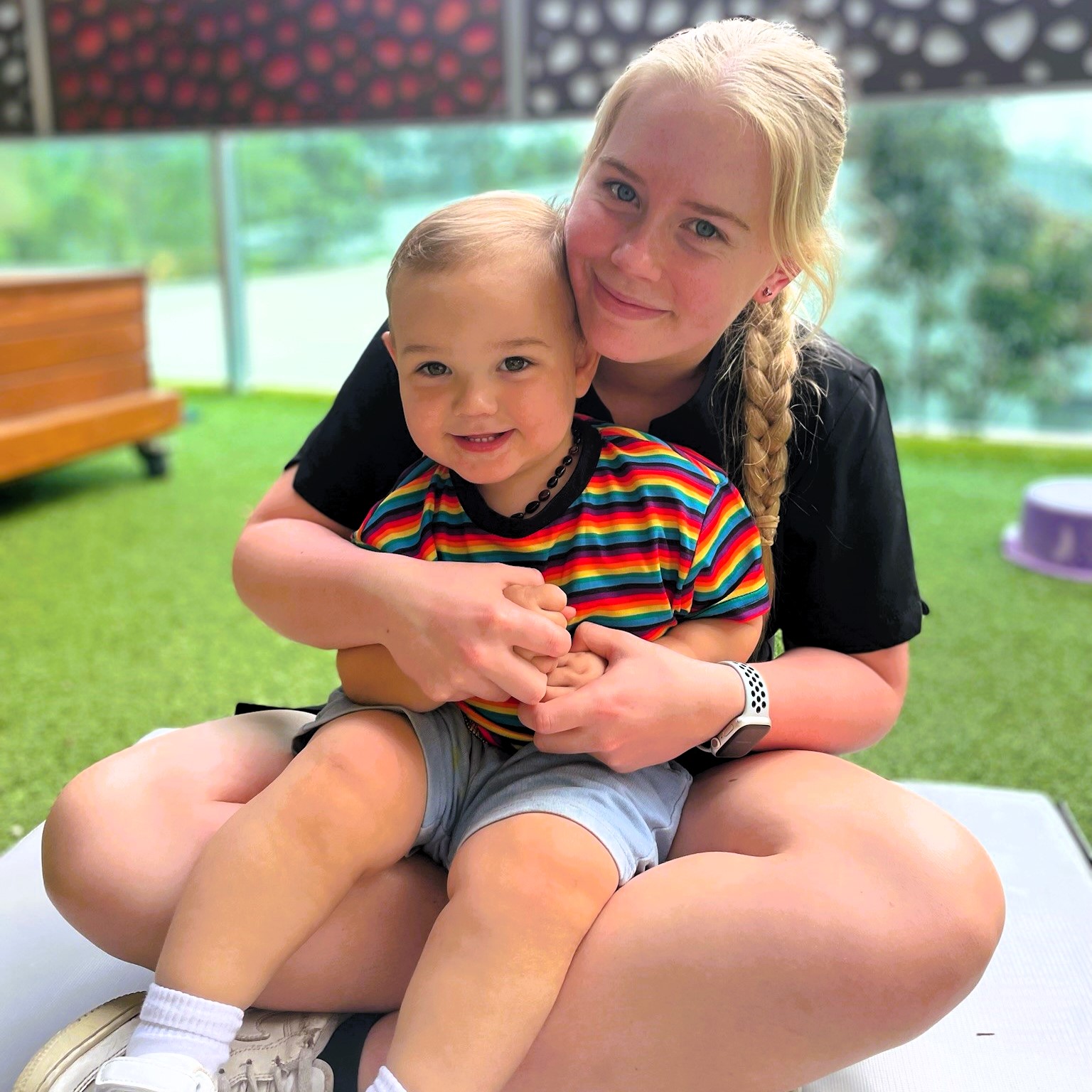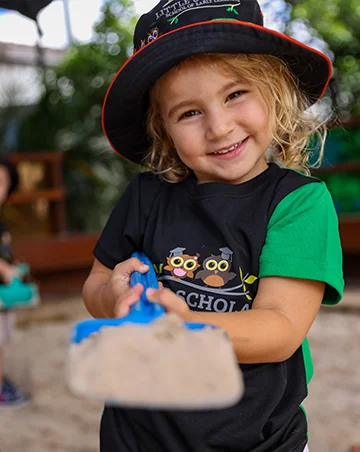Parental separation anxiety : what it is and how to deal with it
Elizabeth Stone, an award-winning essayist and journalist, once captured the essence of parenthood with a poignant quote, ‘Making the decision to have a child – it is momentous. It is to decide forever to have your heart go walking around outside your body.’ This statement resonates deeply with many parents, astutely capturing the feelings of boundless love and the inevitable vulnerability that comes with bringing a child into the world.
This overwhelming surge of emotion is particularly intense during those initial moments and first days of separation from your child, often experienced when that child is entrusted to the care of someone else for the first time. It’s a milestone filled with mixed emotions for parents – pride in their growing independence, yet a deep longing to keep them close forever.
While the focus in the first few weeks at early learning facilities is generally on the children and how they’re settling in, an often-forgotten topic is the separation anxiety parents also can feel when they drop their little ones in care for the first time.
In childcare, we offer families tips on how to help children settle in, from suggestions such as: ‘don’t sneak away’, ‘keep goodbyes short’, and ‘maintain calm and confidence’, but what if the child is just fine, but the parents are struggling from the separation?
It’s understandable. If you’re coming off maternity or paternity leave, or perhaps you’ve been the primary parent at home for the last few years, change can be profoundly hard.

What we’re talking about is parental separation anxiety, and it’s more common than you think.
“I experienced separation anxiety with both my children when I dropped them into care for the first time, but I was much more surprised with my feelings the second time around,” says Christina, a communications professional who has two children. “I had to go back to work much earlier the second time around, and I felt a lot of grief for not getting to continue to bond with my son the way I had been, knowing he was my last baby. I also experienced some fears around him attaching to his educators more than me.”
A 2016 study by Pacey UK (the professional association for childcare and early years) reported that out of 1,000 mothers, 70% of mums said they worried about the extent they would miss their children, 90% reported feeling anxious about returning to work after having a child, while nearly half of mums admitted being very anxious.
The signs of struggle in parents
How can parental separation anxiety manifest itself? Some of the more obvious signs are tears. Anxious feelings. Moodiness. While others you may not notice until they start affecting your life and mental health.
Here are some common indicators of more serious separation anxiety to be aware of:
- Persistent worrying and imagining the worst-case scenarios
- Elevated levels of anxiety or depression
- Intense distress and experiencing panic attacks
- Experiencing feelings of anger
- Physical symptoms when apart from your child, such as headaches, nausea, or stomachaches
- A constant desire to be aware of your child’s whereabouts at all time.
Reconciling anxious feelings
Ask yourself, what is your biggest fear or worry in separating from your child? The initial step in overcoming these feelings is to acknowledge and understand them. If you’re experiencing heightened anxiety about being apart from your child, it’s important to explore the origins of these feelings. Perhaps they stem from experiences in your life in childhood, or birth trauma, the loss of pregnancy or another child, perinatal or postnatal anxiety/depression and existing anxiety issues, or it may simply be triggered by the act of becoming a parent.
“How does a parent reconcile these feelings of separating from their child? I think what’s important about that one is that often it’s around guilt,” says Sarah Bergman, a clinical psychotherapist at Counselling on the Coast who has more than three decades of experience in emotionally-focused therapy.
“Guilt is really an emotion that comes up when we have like an idealised sense of a situation or who we are. So we feel guilty when we don’t feel we’ve reached what we want to be reaching or we haven’t done what we want to do. I would say to explore those feelings of guilt, what they are, what you feel like you’re not doing for your child or getting right for your child.”
Sarah says those guilty feelings in parents often link back to situations in their own childhood where they felt like their own parents let them down. But the concern is also passing down those guilty or anxious feelings to your child.
“Their own wounds start to muddy the waters of the child’s experience. So the child’s just going to school, but then they feel their parents anxiety and then they also think that something’s wrong then too, which can make them anxious. So if the parents have a good look at themselves around, ‘what was it that my parents got wrong for me? or what was it that wounded me? and how does that now play across on my child?’ So the parents will often work hard to do the things that they don’t want that their children to experience themselves.”
While Sarah says often the guilty feelings stem from what they missed in their own childhood, the opposite could be true.
“Maybe [parents feel they’re] not meeting the ideals of what your parent did for you or what things that you really loved about your parent and now you feel like you’re not getting that right.”
Wherever the feelings stem from, Sarah says, parents may be trying to heal themselves through their relationship with their child. But, she says, a child doesn’t have those wounds. They don’t experience their parents in that same way that perhaps you did. So she surmises parents could be overcompensating for their own childhood pain.

“Those kind of parents are very anxious at feeling like they have to attend to everything with their children because they don’t ever want their children to feel the way that they did,” Sarah summarises.
Consider jotting down your feelings or discussing them with a sympathetic friend or even a colleague who could relate with what you’re currently experiencing. Regardless of how trivial or illogical they might seem, allowing yourself to express and discuss these fears can aid in releasing them.
Making the decision to have a child – it is momentous. It is to decide forever to have your heart go walking around outside your body.
Elizabeth Stone
Sarah also suggests parents educate themselves on secure attachment, a theory first proposed by the British psychologist, psychiatrist, and psychoanalyst John Bowlby. For children, secure attachment to someone like a mum or dad allows them the secure base necessary to explore, learn and relate, and the well-being, motivation, and opportunity to do so. It’s important for safety, stress regulation, adaptability, and resilience and ultimately can help produce a happy, healthy well-adjusted child.
“If you are securely attached, you will feel less anxious because you will feel comfortable that you can trust, you have a positive view of other people and a positive view of self,” Sarah says. “So you think to yourself, ‘it’s okay. My child is in safe hands. They will let me know. I trust the daycare centre. And I trust myself that I’m doing the right thing by my child and it’s going to be okay and I need to go to work and this is just the way it is.’ Whereas someone who is more anxiously attached sometimes have a bit of a negative view of themself and possibly a bit of negative view of others so they don’t totally trust others, so it’s about trying to move into being more securely attached.”
She also says to have an honest conversation with educators or your campus manager.
“You know, that is actually good secure relating as well, that a parent can actually say, ‘I’m feeling a bit nervous’, or ‘I’m a bit worried about that,’ because they’re asking then, they’re not coping alone.”
Sarah recommends in that conversation, have a chat with educators or your campus manager about what might help to alleviate those anxious feelings, whether it’s a phone call or a text, a few extra pictures – whatever it is, having clear communication can help everyone.
“What helped me was an honest discussion with my son’s lead educator during a playdate. She asked me thoughtful questions about why I was having a hard time, asked how she could help alleviate those feelings for me, and was very mindful to update with lots of pictures, and even checked in on me at pick-up over the next few weeks. It was really helpful, and gave me feelings of trust in leaving my baby with her and her team,” Christina adds.
Those secure attachments we want children to have means we also want them to have bonds with others, such as loving educators.
A child who has had a secure attachment with her parent or another safe adult is more likely to be able to develop lasting successful relationships as an adult. In fact, a New York University study recently found positive, warm relationships between caregivers and children were associated with higher odds of attaining ideal heart health at multiple points across a 20-year span of adulthood, so developing these bonds is good for their health!
Part of early childhood training for educators is understand various child development theories such as attachment theory, so trust that your educators understand what secure attachments – both to parents and others children can trust – mean for children’s development and they work hard to ensure these bonds with your child.
Research has found our adult relationships are shaped by our early patterns of attachment and the ways we learn to deal with closeness and separation.
“Children are very attached to their parents and they love their parents very much. And that is who they want to be with. And if they create an attachment with someone else, that’s lovely. However, ultimately it’s important to keep in mind they will want to be with their parents,” Sarah says.
The pressure of parenting perfection
Sarah also says some of these feelings may be pressure we put on ourselves as parents.
“We don’t actually have to be perfect parents and I think a lot of people are really trying to be perfect parents and wrapping their children in bubble wrap. You just have to be good enough. I think from memory it’s only like around 60 or 70 per cent strike rate of meeting the child’s needs.”
Sarah is referring to the Winnicott theory.
“The good-enough mother is one who makes active adaptation to the infant’s needs, an active adaptation that gradually lessens, according to the infant’s growing ability to account for failure of adaptation and to tolerate the results of frustration.” – D. W. Winnicott, paediatrician and parent-infant therapist.
“We all have to learn that sometimes our needs aren’t going to be met. And that’s actually where we build resilience and we build understanding around that other people have things they need to do as well,” Sarah says. “You don’t have to drop everything to be there for your kids. It’s okay to have ruptures with your children. It’s actually okay because that is a realistic expectation on relationships. We all have ruptures and then we get to learn how to repair those ruptures. But of course, if the child’s fallen over or they’ve hurt themselves or they’re scared at night, you want your strike rate on those things needs to be closer to 100 per cent.
“But otherwise, we don’t have to be so hard on ourselves, we can get it wrong sometimes. We just go back and say, ‘Hey, I’m sorry I got that wrong.’ And then the child also learns that they’re going to get things wrong sometimes, too. They can come to their parent and say, ‘Hey, Mum, sorry about that.’”
If we can offer some advice, it’s what we also suggest to parents when children are having a hard time with separating. Find an activity you can do together outside of care hours that you can look forward to, so you can cherish your time together. Maybe after pick-up, you take your child for a walk or to the park, maybe it’s grabbing a sneaky ice cream after dinner, maybe it’s a game night or story time when you get home. Find ways to really connect with your child in the time you’re together may make the time you’re apart easier to deal with.
Sarah says mindful activities can help in easing anxious feelings. But, she says, if these feelings are taking over, it might be worth talking to a professional as soon as possible. You can talk to your GP about a referral to see a psychologist, or you can book in to a specialist practice such as Sarah’s Counselling on the Coast to have a chat with a psychotherapist.
Please remember, if Little Scholars can help in any way, we will, from offering a listening ear, to phone calls to whatever would help your family, we will. We’re not just here for children, we’re here for the whole family.



